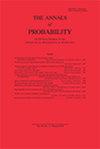cluster sets for partial sums and partial sum processes
IF 2.5
1区 数学
Q1 STATISTICS & PROBABILITY
引用次数: 1
Abstract
Let $X,X_1,X_2,\ldots$ be i.i.d. mean zero random vectors with values in a separable Banach space $B$, $S_n=X_1+\cdots+X_n$ for $n\ge1$, and assume $\{c_n:n\ge1\}$ is a suitably regular sequence of constants. Furthermore, let $S_{(n)}(t),0\le t\le1$ be the corresponding linearly interpolated partial sum processes. We study the cluster sets $A=C(\{S_n/c_n\})$ and $\mathcal{A}=C(\{S_{(n)}(\cdot)/c_n\})$. In particular, $A$ and $\mathcal{A}$ are shown to be nonrandom, and we derive criteria when elements in $B$ and continuous functions $f:[0,1]\to B$ belong to $A$ and $\mathcal{A}$, respectively. When $B=\mathbb{R}^d$ we refine our clustering criteria to show both $A$ and $\mathcal{A}$ are compact, symmetric, and star-like, and also obtain both upper and lower bound sets for $\mathcal{A}$. When the coordinates of $X$ in $\mathbb{R}^d$ are independent random variables, we are able to represent $\mathcal {A}$ in terms of $A$ and the classical Strassen set $\mathcal{K}$, and, except for degenerate cases, show $\mathcal{A}$ is strictly larger than the lower bound set whenever $d\ge2$. In addition, we show that for any compact, symmetric, star-like subset $A$ of $\mathbb{R}^d$, there exists an $X$ such that the corresponding functional cluster set $\mathcal{A}$ is always the lower bound subset. If $d=2$, then additional refinements identify $\mathcal{A}$ as a subset of $\{(x_1g_1,x_2g_2):(x_1,x_2)\in A,g_1,g_2\in\mathcal{K}\}$, which is the functional cluster set obtained when the coordinates are assumed to be independent.部分和和过程的聚类集
设$X,X_1,X_2,\ldots$为i.i.d,表示零随机向量,其值在可分离的巴拿赫空间$B$中,$S_n=X_1+\cdots+X_n$为$n\ge1$,并假设$\{c_n:n\ge1\}$是一个适当的正则常数序列。更进一步,设$S_{(n)}(t),0\le t\le1$为相应的线性内插部分和过程。我们研究聚类集$A=C(\{S_n/c_n\})$和$\mathcal{A}=C(\{S_{(n)}(\cdot)/c_n\})$。特别地,$A$和$\mathcal{A}$被证明是非随机的,并且当$B$和连续函数$f:[0,1]\to B$中的元素分别属于$A$和$\mathcal{A}$时,我们推导出准则。当使用$B=\mathbb{R}^d$时,我们改进了聚类标准,以显示$A$和$\mathcal{A}$都是紧凑的、对称的和星形的,并且还获得了$\mathcal{A}$的上界和下界集。当$\mathbb{R}^d$中$X$的坐标是独立随机变量时,我们可以用$A$和经典Strassen集合$\mathcal{K}$来表示$\mathcal {A}$,并且,除了退化的情况外,表明$\mathcal{A}$在$d\ge2$时严格大于下界集合。此外,我们证明了对于$\mathbb{R}^d$的任何紧致的、对称的星形子集$A$,存在一个$X$使得对应的功能簇集$\mathcal{A}$总是下界子集。如果是$d=2$,那么额外的细化将$\mathcal{A}$标识为$\{(x_1g_1,x_2g_2):(x_1,x_2)\in A,g_1,g_2\in\mathcal{K}\}$的子集,是假设坐标独立时获得的功能集群集。
本文章由计算机程序翻译,如有差异,请以英文原文为准。
求助全文
约1分钟内获得全文
求助全文
来源期刊

Annals of Probability
数学-统计学与概率论
CiteScore
4.60
自引率
8.70%
发文量
61
审稿时长
6-12 weeks
期刊介绍:
The Annals of Probability publishes research papers in modern probability theory, its relations to other areas of mathematics, and its applications in the physical and biological sciences. Emphasis is on importance, interest, and originality – formal novelty and correctness are not sufficient for publication. The Annals will also publish authoritative review papers and surveys of areas in vigorous development.
 求助内容:
求助内容: 应助结果提醒方式:
应助结果提醒方式:


